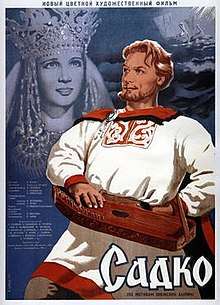Sadko (film)
Sadko (Russian: Садко) is a 1953 Soviet fantasy film directed by Aleksandr Ptushko. The film is based on an opera by Nikolai Rimsky-Korsakov, which was based on a Russian bylina (epic tale) with the same name, and scored with Rimsky-Korsakov's music from the opera.
| Sadko | |
|---|---|
 Poster for Sadko | |
| Directed by | Aleksandr Ptushko |
| Written by | Konstantin Isayev |
| Based on | Sadko by Nikolai Rimsky-Korsakov |
| Starring | Sergei Stolyarov Alla Larionova Yelena Myshkova |
| Music by | Nikolai Rimsky-Korsakov (music from the opera Sadko) Vissarion Shebalin (arrangements and additional music) |
| Cinematography | Fyodor Provorov |
Production company | |
| Distributed by | Filmgroup (US version) |
Release date |
|
| Country | Soviet Union |
| Language | Russian |
Plot summary
This tale is based upon the legends told of ancient times in the old Russian city of Novgorod (the capital of Novgorod republic). Novgorod's merchants are feasting in a gorgeous palace. A young gusli player named Sadko is bragging that he can bring to their land a sweet-voiced bird of happiness. The merchants mock him for his bravado, and tell him his quest is impossible. Nevertheless, Sadko sets off on a travel to bring the bird of happiness to Novgorod. He is offered help by the daughter of the Ocean King - she is mesmerized by Sadko's singing and is in love with him. Sadko visits many lands in his search of the bird, including India, Egypt and other countries. Sadko is unable to capture the bird of happiness, and returns empty handed. But on his return to Novgorod, Sadko realizes that there is no better land than his homeland, and there is no need to go far in search of one's happiness.
Cast
- Sergei Stolyarov as Sadko
- Alla Larionova as Lyubava
- Ninel Myshkova as Princess of Lake Ilmen (as Y. Myshkova)
- Boris Surovtsev as Ivashka the boy
- Mikhail Troyanovsky as Trifon
- Nadir Malishevsky as Vyashta the Giant (as N. Malishevsky)
- Nikolay Kryuchkov as Omelyan Danilovich
- Ivan Pereverzev as Timofey Larionovich
- Yuri Leonidov as Kuzma Larionovich
Awards
Sadko won the "Silver Lion" award at the Venice Film Festival in 1953, and festival judges included lead actor Sergei Stolyarov in a list of the world’s best actors in the 50-year history of film.
The Magic Voyage of Sinbad
Sadko was first shown in the USA in 1953 with English subtitles, distributed by Artkino Pictures Inc..
The film was re-released in the United States in 1962 in an English-dubbed and modified form by Roger Corman's Filmgroup under the title The Magic Voyage of Sinbad. It retains the plot structure of Sadko but includes several changes: the total running time is reduced from approximately 85 to 79 minutes (most of the deleted footage consists of scenes in which songs are performed, though one song is retained and sung in English), voice-over narration is added, the protagonist "Sadko" is renamed "Sinbad," and other characters and places are renamed to disguise the film's Russian origin and transform the film into a story about Sinbad the Sailor (perhaps most significantly, the city of Novgorod is renamed "Copasand"). The English dubbing in this version arguably gives the film a slightly "campier" tone than the original version, in which the dialogue has a more polished and literate tone. Cast and credits were also altered to made-up "American-sounding" names. The "Script Adaptor" for this version of the film, uncredited, was a young Francis Ford Coppola.
This version of the film was featured in Season 5, Episode #505 of Mystery Science Theater 3000 in 1993, despite the fact that Kevin Murphy, voice of Tom Servo, has professed a love for the "breathtaking" visual style of this and other films by Aleksandr Ptushko in multiple interviews.[1][2] Paul Chaplin, another writer of the show, has also expressed admiration elsewhere, but not regrets for the mockery.
DVD release
The original Russian version of Sadko is available on DVD from RusCiCo.
The Mystery Science Theater 3000 treatment of the film was released on DVD as part of the 20th four-film box set of series episodes, through Shout! Factory on March 8, 2011. In some sets the DVD is mislabeled as the film Project Moonbase.
See also
- Sadko, the Russian bylina (epic tale) upon which the film and opera are based
- Sadko (musical tableau), a symphonic poem by Nikolai Rimsky-Korsakov.
- Sadko (opera), an opera by Rimsky-Korsakov.
- Rimsky-Korsakov is a film also from 1953 that presents fragments of the opera.
References
- The MST3K Review
- Nikki Tranter. Enjoying The Squirm: A Moment with Kevin Murphy, Popmatters, 2002-12-26
External links
| Wikimedia Commons has media related to Sadko (1952 film). |